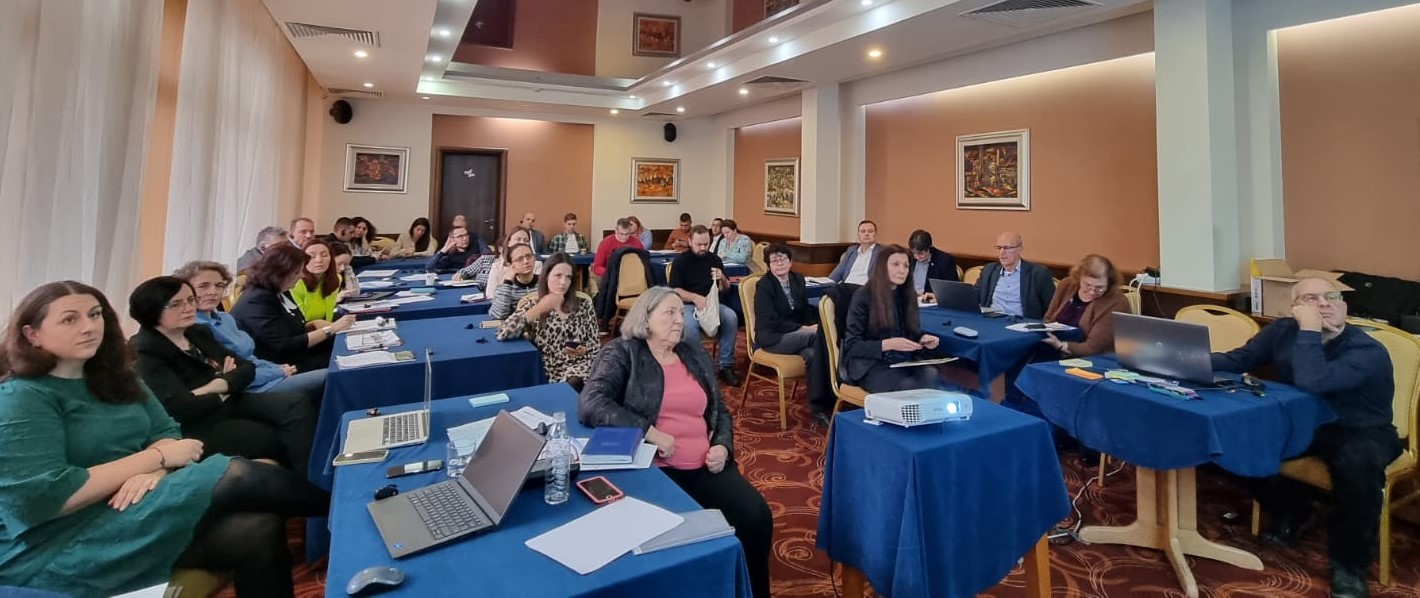Decoding Municipal Energy Management: Romania vs. Bulgaria – Identifying Similarities and Differences
During a workshop held in Sofia on 5-6 December 2023, the consortium team of EUKI project MENERGERS debated for two days to identify similarities and differences in Municipal Energy Management between the two focus countries Bulgaria and Romania. The event aimed to contribute to the co-creation of innovative solutions through the exchange of views and experiences at national and local level.

The Romanian delegation included representatives of the Ministry of Energy / the Department of Energy Efficiency, the Romanian Society of Energy Auditors and Managers and the selected MENERGERS cities – Alba Iulia, Sfântu Gheorghe and Zalău. The Bulgarian group comprised representatives from the Ministry of Energy, the Ministry of Environment and Water, the engaged municipalities such as Russe, Sapareva Banya, Svilengrad Municipality, Lom Municipality, Dobrich Municipality, as well as from the Sustainable Energy Development Agency and the National Association of Municipalities.
In the discussion of the Romanian case study, the main challenges of the Municipal Energy Management system were highlighted: low involvement of the local level in national energy planning, difficulties in accessing financial instruments dedicated to energy reduction projects, insufficient human resource capacity, contested multi-level governance and difficulties in collecting and analysing relevant data. Communication with the national level and relevant stakeholders is also difficult. Concrete solutions have been collected to improve communication methods and create contexts to make this process more efficient: more types of meetings to be organised, the need for workshops and events tailored to the needs of local actors, information “translated” into the language of those invited.
As far as the process of comparing the two countries is concerned, it has been carried out in three different sectors: legislation, vocational training programmes and the practical side. Thus, even if in Romania there is a legal obligation to have energy managers and energy efficiency programmes, the legislation is too broad to be put in practice and there are no legal consequences for municipalities that do not comply with the law. On the other hand, in Bulgaria, there is currently no formal obligation to employ energy managers in municipalities, despite the existence of some legislation. In addition, there are currently no laws regulating energy management in Bulgaria.
In Romania, there is already a professional society and a national centre specialised in training auditors and managers. There is also a clear lack of funding programmes and grants available for people wishing to obtain training. In Bulgaria, although there are some training courses available and qualified staff, the salaries offered are quite low.
At present, in Romania, there is a lack of established best practices for energy management in municipalities and many face difficulties when trying to adopt such sustainable measures. In Bulgaria, the subsidy-based market does not always focus on meeting the needs of municipalities. Energy management data is not used for strategic planning and there is very little energy management capacity. Although everyone understands the importance of implementing energy efficiency measures, there is not enough teamwork for implementation.
An important aspect after analysing the current situation in the two countries was to facilitate discussions on what the representatives of the municipalities present at the workshop need. In Romania they want to implement clear and well-defined legislation for green financial instruments, ESCOs (Energy Services Company) and green bonds. In Bulgaria, they want a well-defined legal framework for the efficient implementation of energy management policies. In Romania, it is important to increase the level of knowledge about energy efficiency practices among the population.
Training methodology should be adopted to ensure effective learning and successful implementation of energy efficient practices. In Bulgaria, EU resources should be used to train experts and provide sufficient ground for competent people to manage energy efficiently. Specialised education in energy management should also be provided.
As far as practice is concerned, in Romania, it would be necessary to establish efficient processes for the renovation of buildings in order to improve their overall condition, and the involvement of as many stakeholders as possible from the relevant fields will make the results sustainable. In order to achieve this objective, it is intended to increase the number of municipal energy managers. Bulgarian municipalities need innovative procurement approaches and political commitment from mayors. Competitive salaries are needed to retain experts. Institutions should support energy management and provide a free national database and energy audits for public buildings. Energy suppliers should report consumption data and automatic data collection should be sent to energy management platforms.
